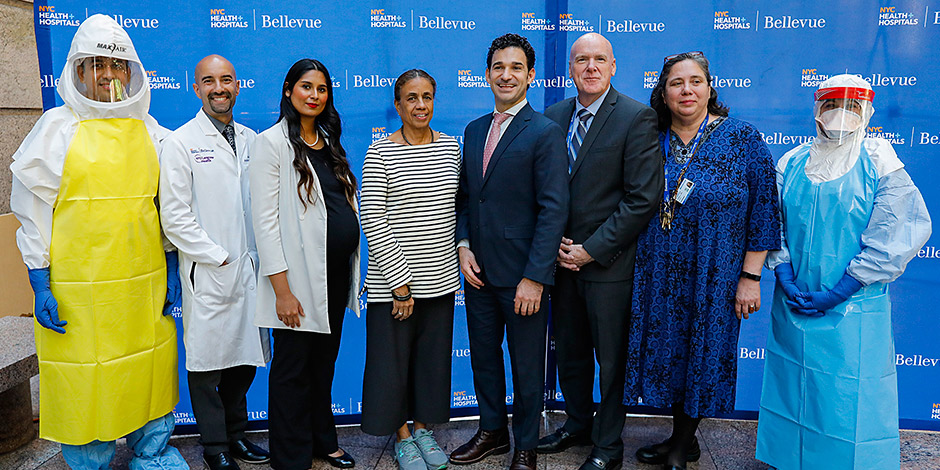NYC Health + Hospitals Marks Five Year Ebola Anniversary, Urges Continuity of Federal Funding for Hospital Preparedness
Public hospital system continues its preparedness efforts as Democratic Republic of the Congo manages the world's second largest Ebola epidemic on record In the face of continued microbe threats such as Ebola, MERS, and Lassa fever, Federal funding for hospital preparedness is set to expire in early 2020
Nov 01, 2019

NYC Health + Hospitals today marked the five year anniversary of the treatment and recovery of NYC’s only confirmed Ebola patient, Dr. Craig Spencer, and urged federal officials to continue funding for hospital preparedness around Ebola and other special pathogens. The Hospital Preparedness Program Ebola funding expires in early 2020. It funds 10 regional Ebola and other special pathogens treatment centers across the country, including NYC Health + Hospitals/Bellevue along with the remaining 10 Health + Hospitals Frontline acute care facilities, and the overall health care system with highest level of readiness and specialty services. The City’s public health system receives $11.1M for its preparedness efforts; funding nationally is $213M. This funding supports health care and first responder training and joint planning, exercises and regional coordination between public health, health care, EMS, and law enforcement to rapidly respond to an infectious disease emergency and facilitate safe patient management.
“NYC Health + Hospitals is a frontline institution that sees over a million patients a year, and to serve our patients with the high quality health care they deserve we have to be prepared for any infectious disease,” said Mitchell Katz, MD, President and CEO of NYC Health + Hospitals. “The Hospital Preparedness Program has allowed our system, and New York City, to prepare and respond to deadly infectious diseases such as Ebola. The continuity of this funding is a necessity if we are to be ready for the next deadly pathogen that comes through our doors.”
“As the Democratic Republic of the Congo grapples with the world’s second largest Ebola epidemic on record, with more than 2,000 lives lost and 3,000 confirmed infections, it is essential that we maintain our vigilance,” said Syra Madad, DHSc, MSc, MCP, Senior Director for System-wide Special Pathogens Program at NYC Health + Hospitals. “Because New York City is a gateway to the world, travel-associated diseases, such as Ebola, Lassa fever and MERS, could present at any time, and our facilities are trained and prepared for such an eventuality.”
“The NYC Health Department works with NYC Health + Hospitals and other city hospitals to be prepared to respond if deadly pathogens appear in our communities,” said New York City Health Commissioner Dr. Oxiris Barbot. “However, preparation commands resources. Federal funding is critical to our health system’s readiness to protect New Yorkers from disease threats like Ebola. Local health departments, public health laboratories, and health care systems around the country cannot continue to function on sporadic federal funding. We cannot wait for the next major public health emergency to maintain critical infrastructure.”
The Hospital Preparedness Program has been the cornerstone of health care system preparedness for 16 years. Ongoing investment is critical for NYC, where our hospitals and public health system are truly America’s front line. NYC funding levels have decreased by 40 percent since FY 2005. Increased and sustained funding is essential to ensure we are prepared.
Ebola and other special pathogens, such as Lassa fever, are associated with high morbidity and/or mortality, have a high likelihood of person-to-person spread, lack an effective vaccine, prophylaxis, or treatment and might prompt the use of a biocontainment unit due to clinical or public health concerns. These pathogens pose a significant risk to healthcare personnel and require specific healthcare facility processes to ensure early identification and isolation of infected patients and the use of effective infection control practices to prevent disease transmission while the patient is further evaluated.
The Hospital Preparedness Program is funded through the Assistant Secretary for Preparedness and Response (ASPR) within the United States Department of Health and Human Services. It funds 10 regional Ebola and other special pathogen treatment centers – NYC Health + Hospitals/Bellevue is one of these sites. These facilities have enhanced capabilities to receive a confirmed Ebola/special pathogen patient. For example, each regional center must have respiratory infectious disease isolation capacity or negative pressure rooms for at least 10 patients. They must also be able to treat pediatric patients or partner with a neighboring facility to do so.
The Hospital Preparedness Program also funds the National Ebola Training and Education Center (NETEC). NETEC is co-led by Emory University in Atlanta, Georgia; University of Nebraska Medical Center/Nebraska Medicine in Omaha, Nebraska; and NYC Health + Hospitals/Bellevue, all three of which have successfully treated patients with Ebola. NETEC offers training, resources, readiness assessments, and expertise to help members of the Regional Treatment Network for Ebola and Other Special Pathogens prepare for pandemics and other emerging threats related to infectious disease outbreaks.
To further build on the public system’s readiness, NYC Health + Hospitals created the Center for Global Healthcare Special Pathogens Preparedness, which advances and strengthens special pathogens preparedness and response efforts of urban healthcare delivery systems. The Center has become an international resource for healthcare delivery systems worldwide.